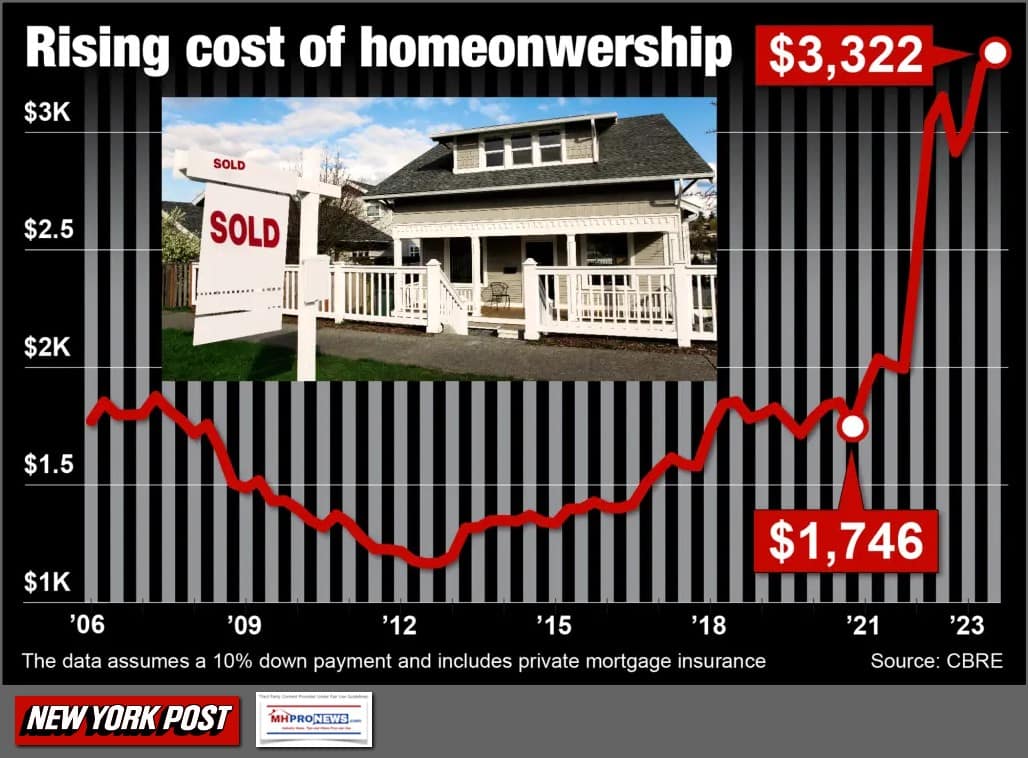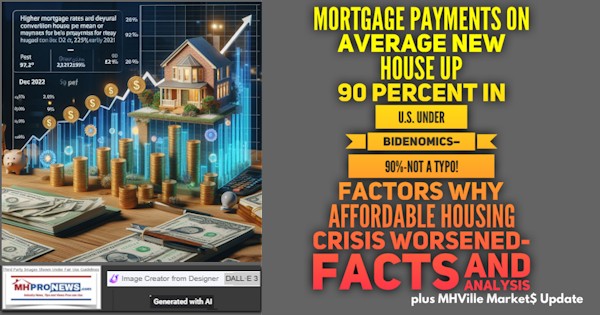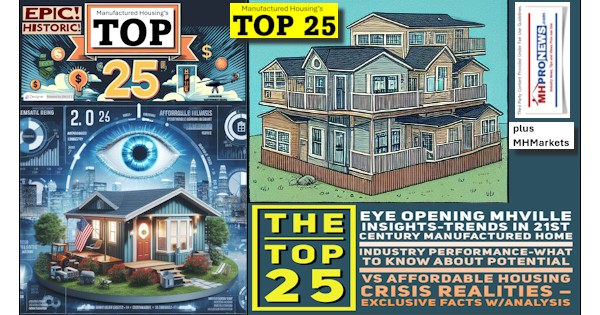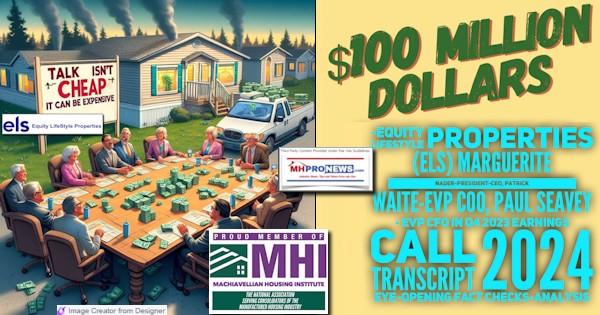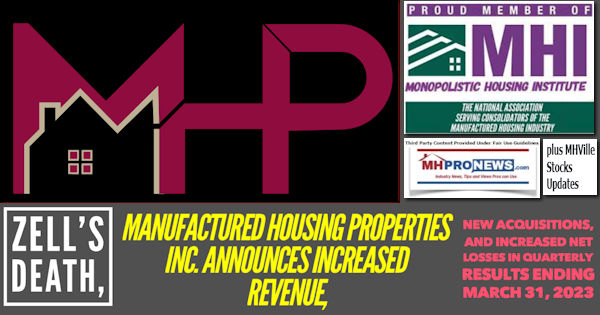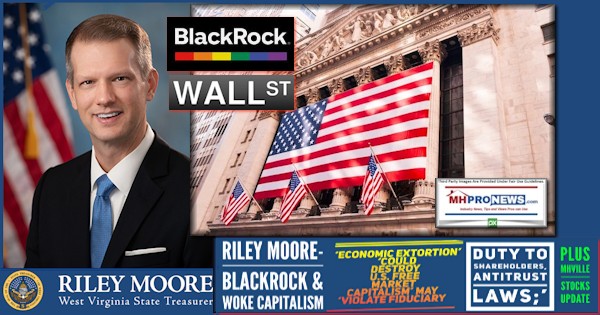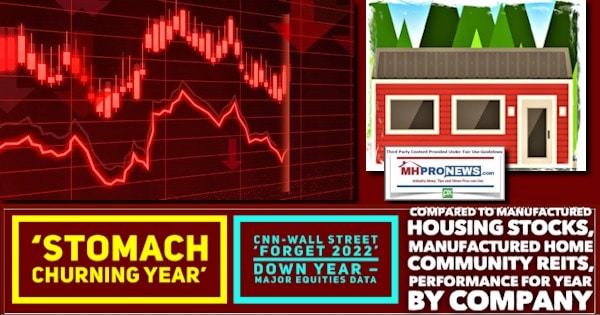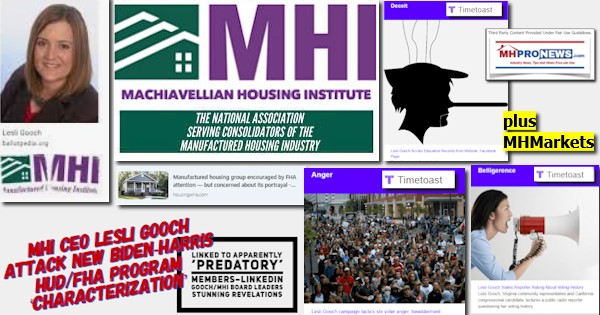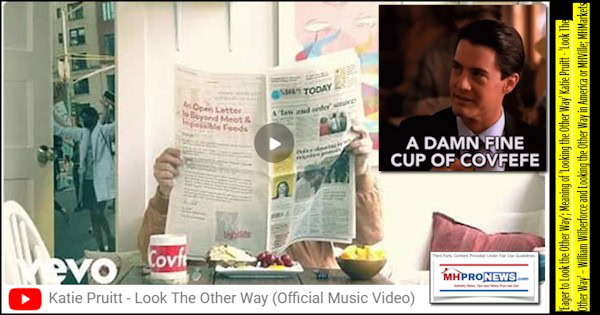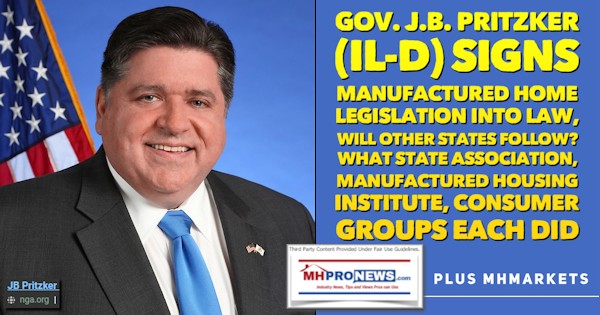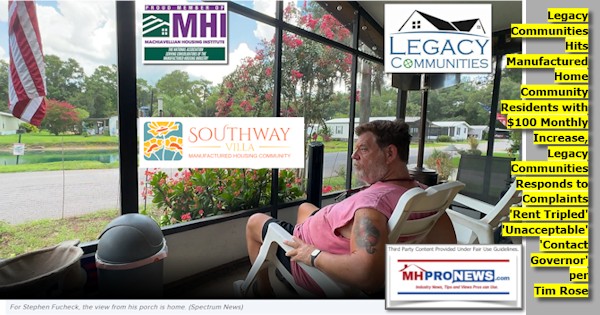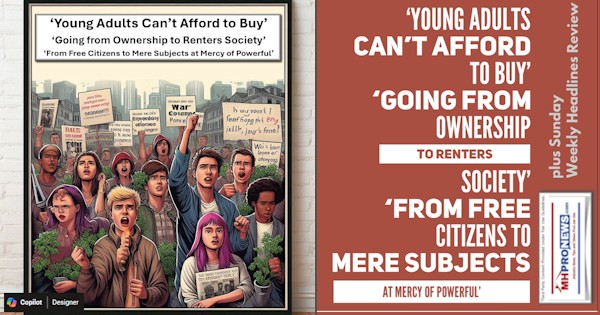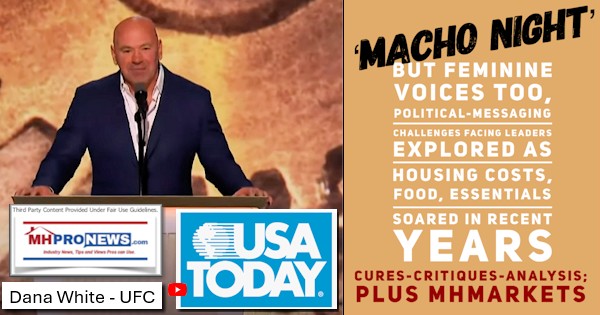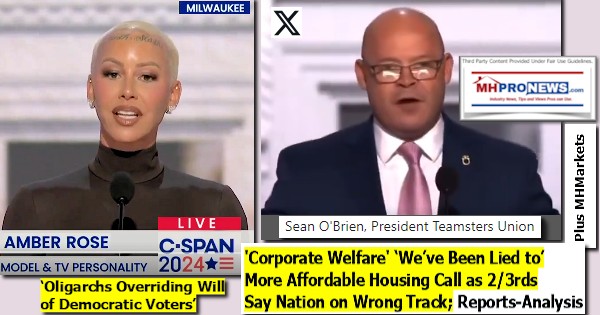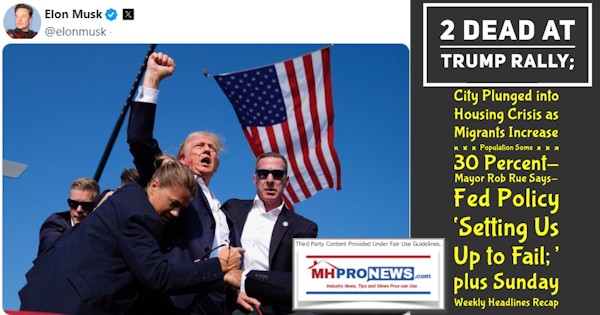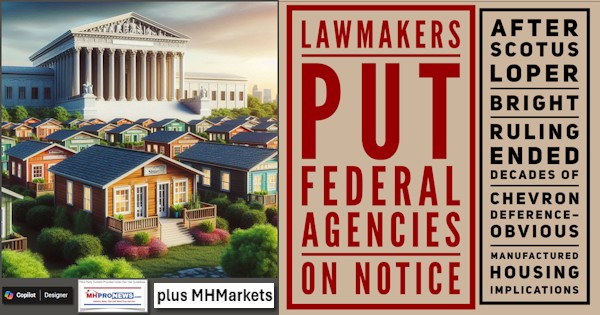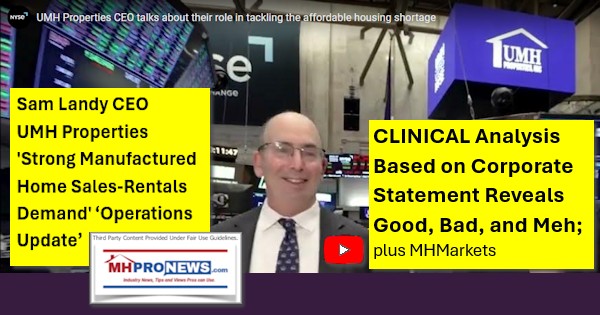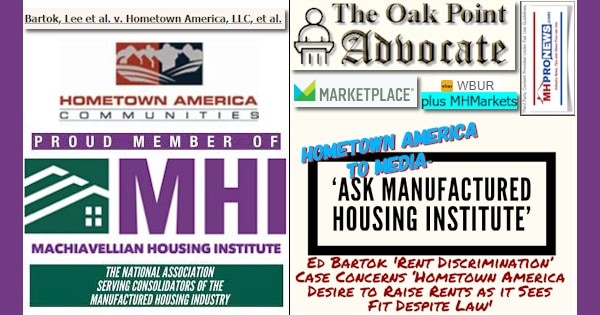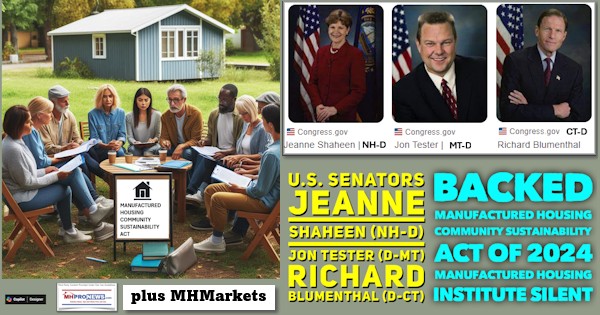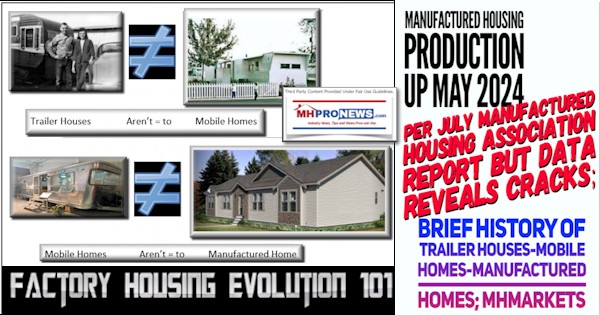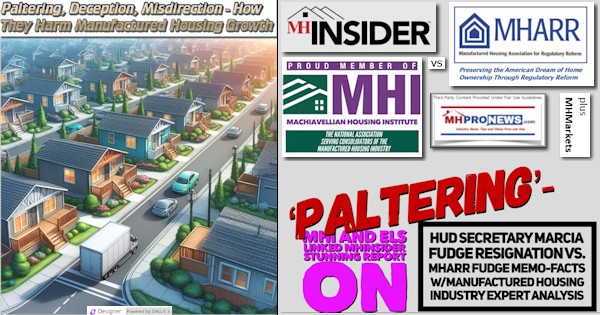
“MHInsider is the leading information source for the manufactured housing industry, providing the manufactured housing news, legislative updates, operational insight, data, statistics, and trends for manufactured housing professionals.” That bold claim is going to be acid tested in the light of the analysis of the Equity LifeStyle Properties (ELS) owned MHVillage’s MHInsider report on the HUD Secretary Fudge resignation. “MHInsider, a subset of the MHVillage site, is in some way seemingly ‘endorsed’ by MHI. A ‘contributor’ to MHInsider is MHI CEO Lesli Gooch” 1. That is from a Q&A with Bing AI powered Copilot, shown further below. Per Copilot: “The absence of certain critical pieces of information in MHInsider’s report could be seen as an example of paltering, as it selectively presents positive aspects while omitting relevant challenges” Part I of this report, with fact checks, analysis and manufactured housing industry expert commentary will provide MHInsider’s text dated 3.11.2024. Part II will provide the official statement from the Manufactured Housing Association for Regulatory Reform (MHARR). Note that as of 3.13.2024 at about 2:29 PM there is no apparent remark under the news category on the Manufactured Housing
Part I – per MHInsider…
HUD Secretary Fudge Resigns
By Patrick Revere
March 11, 2024
Final Day March 22, Deputy Secretary Adrianne Todman Named Interim
Secretary of the U.S. Department of Housing and Urban Development Marcia Fudge has announced she will leave her post March 22, and will be replaced on an interim basis by Deputy Secretary Adrianne Todman.
Fudge said in interviews that she has “mixed emotions” about retiring after decades in public service and that HUD “was the ideal opportunity to culminate a career focused on doing the most good for the most people, including those who have often been left behind or left out.”
While Fudge’s departure is somewhat of a surprise, it’s not uncommon for cabinet positions to open in the face of a presidential election. Fudge is the second member of the Biden-Harris White House cabinet to step away, preceded by Labor Secretary Marty Walsh exiting that post in 2023.
“It has always been my belief that government can and should work for the people,” Fudge wrote. “For the last three years, I have fully embraced HUD’s mission to create strong, sustainable, inclusive communities and quality affordable homes for all. The people HUD serves are those who are often left out and left behind. These are my people. They serve as my motivation for everything we have been able to accomplish.”
Fudge served in the lead role at HUD for more than three years, navigating the department through the COVID-19 pandemic. She said she will return to Ohio and private life.
“It’s time to go home,’’ Fudge told USA TODAY in an exclusive interview on her resignation. “I do believe strongly that I have done just about everything I could do at HUD for this administration as we go into this crazy, silly season of an election.”
With that, Fudge told the outlet that housing should be a top issue for both Republicans and Democrats.
‘‘It is not a red or blue issue,’’ the secretary was quoted as saying. “Everybody knows that it is an issue so it’s not a one-sided issue. It’s an American issue.’’
Fudge’s work was lauded in a letter from the White House.
“Under Marcia’s transformational leadership, we have worked hard to lower housing costs and increase supply. We’ve proposed the largest investment in affordable housing in U.S. history. We’ve taken steps to aggressively combat racial discrimination in housing by ensuring home appraisals are more fair and by strengthening programs to redress the negative impacts of redlining,” the statement read. “Thanks to Secretary Fudge, we’ve helped first-time homebuyers, and we are working to cut the cost of renting. And there are more housing units under construction right now than at any time in the last 50 years.”
Prior to her tenure at HUD, Fudge served as U.S. Representative for the 11th Congressional District of Ohio and was a member of several Congressional Caucuses and was past chair of the Congressional Black Caucus. As a Member of Congress, she earned a reputation of tackling the unique challenges of her district by working with her delegation and across political ideologies. Fudge’s career in public service began in the Cuyahoga County Prosecutor’s Office, rising to the rank of director of Budget and Finance.
Interim Secretary Todman previously worked as a legislative director for Congressman Ron de Lugo, a delegate of the U.S. Virgin Islands. She also served as a policy aide in HUD’s Office of Public and Indian Housing, spent time with District of Columbia Housing Authority, and was selected in 2017 as the CEO of the National Association of Housing and Redevelopment Officials before returning to HUD. ##
MHProNews Notes: the above is their text provided under fair use guidelines, sans their illustration and caption, which are at best only marginally relevant to this discussion.
Following the MHInsider’s article also said: “MHInsider is the leader in manufactured housing news and is a product of MHVillage…” Bing Copilot, as well as prior MHProNews fact checks, have repeatedly debunked that claim, including by using a pull quote from now MHVillage Co-President Darren Krolewski. More in Part III below.
Part II
MHARR March 11, 2024 Washington Update — An Exclusive Report and Analysis
REPORT AND ANALYSIS
IN THIS REPORT: MARCH 11, 2024
- HUD SECRETARY ANNOUNCES RETIREMENT
- AEI ANALYSIS VINDICATES MHARR INDUSTRY PRIORITIES
- “AFFORDABLE” IS THE CORRECT TERM FOR HUD CODE MH
HUD SECRETARY MARCIA FUDGE ANNOUNCES RETIREMENT/RESIGNATION
In an unexpected announcement issued on March 11, 2024, HUD Secretary Marcia Fudge has announced her retirement/resignation as Secretary of the U.S. Department of Housing and Urban Development (HUD), effective March 22, 2024 (copy attached). The Secretary’s announcement does not state any cause or reason for her early departure, nearly a year before the conclusion of President Biden’s current term of office.
While Secretary Fudge, during her tenure, made a number of positive statements regarding affordable, mainstream manufactured housing and the role that it could play in addressing the nation’s affordable housing crisis, concrete action on a number of the key roadblocks suppressing the availability and utilization of HUD Code homes, including, most particularly, the abuse of zoning and land use laws to discriminatorily exclude manufactured housing from communities and areas around the country, has not been forthcoming.
This is a rapidly-developing situation. MHARR will closely monitor developments relating to the selection of a new – or acting – Secretary, and will provide further updates as warranted.
AEI ANALYSIS OF BIDEN HOUSING POLICIES VINDICATES MHARR PRIORITIES
On March 1, 2024, MHARR published a talking points paper explaining and highlighting the three main bottlenecks that are suppressing the “production, marketing and sales of affordable, mainstream manufactured homes.” This paper added additional context to MHARR’s July 2022 White Paper regarding the “Exploitation of Federal Housing Finance and Mortgage Assistance Programs and Potential Solutions” – addressing the under-reported reality that federal funding for “housing” and “housing finance” programs rarely if ever “reaches the ground” in large volume for mainstream, affordable manufactured housing and manufactured housing consumers.
The three main bottlenecks suppressing the HUD Code industry – currently and historically – for at least two decades (and in some cases longer), are discriminatory and exclusionary zoning, limited availability of market-competitive, government-backed consumer financing and, more recently, the looming threat of draconian, discriminatory U.S. Department of Energy (DOE) “energy conservation” standards for manufactured homes. All of these factors have – and unless remedied, will continue to – needlessly limit the availability and utilization of affordable, mainstream manufactured homes in many areas of the country, notwithstanding record-breaking demand for affordable housing and home ownership.
And now, a widely-respected policy organization in Washington, D.C., the Housing Center of the American Enterprise Institute (AEI), led by Edward Pinto, has released an analysis of the housing policy and related spending initiatives announced by President Biden during his recent State of the Union speech, which in substantial part corresponds with and supports one of the principal assertions of MHARR’s summary and earlier White Paper – specifically, that needlessly restrictive zoning and land use laws have been and are suppressing the supply of affordable starter homes (which category necessarily includes affordable, mainstream manufactured homes) (see copy attached). In part, that analysis states:
“There is a growing consensus that the solution to making housing more affordable lies in adding more housing supply, not in easy credit and market distorting subsidies. The solution is for states and localities to free the market from unduly restrictive zoning and land use restrictions that constrain supply and drive up home prices.”
(Emphasis added).
In substantial part, then, federal housing (i.e., spending) programs do little to actually benefit either manufactured housing consumers or the manufactured housing industry because – despite the fact that HUD Code homes are the nation’s premier source of inherently affordable home ownership – those same homes (and their residents) are discriminatorily excluded from far too many areas of the country. Therefore, rather than trumpet spending that will not “reach the ground” for the HUD Code market, HUD should and must address the root cause(es) of the problem, including discriminatory zoning and land use laws. HUD currently has – and has had – the legal means to remove these baseless restrictions, in the form of the enhanced federal preemption of the Manufactured Housing Improvement Act of 2000 (2000 Reform Law), but has failed and refused to take the necessary action. This must change for the industry to fulfill the affordable housing role and mission that Congress foresaw for it in the 2000 Reform Law and it must be the goal, objective and mission of the industry’s national representatives – and most especially the national representative of its post-production sector – to advance zoning equity as well as fully competitive and available consumer financing for HUD Code homes and HUD Code consumers.
MANUFACTURED HOUSING IS AFFORDABLE HOUSING
As MHARR stressed in its November 2023 Issues and Perspectives article, “What’s in a Name? – Everything,” both the name and description(s) of the homes that industry members produce, sell, market, finance and supply are important. Fundamental industry messaging to both public (i.e., government) and private entities with an interest in manufactured housing, is critical to the availability, utilization and, even more importantly, the wider acceptance of manufactured housing as a crucial source of affordable housing and home ownership. And it is that single word – “affordable” – that is of overriding and overwhelming importance in this context. That is why MHARR, more than two decades ago, led the way in advancing not only the inclusion, but the emphasis of that term in the Manufactured Housing Improvement Act of 2000.
That is why it is both troubling and puzzling that some within the industry are apparently working to move away from the industry’s long-time emphasis on affordability and manufactured homes as a source of inherently affordable home ownership, and are instead describing HUD Code homes as “attainable.” This effort is curious not only because concept of “affordability” is specifically ingrained in federal law, but also because the language and concept of affordability is more widely accepted and used today than ever before. Indeed, the terms “affordable” and “affordability” have been used not only by HUD Secretary Marcia Fudge, but by President Biden himself, as recently as his State of the Union address, as shown in AEI’s attached analysis. Why then, would anyone, let alone an advocate for manufactured housing, sacrifice the use of that positive and important descriptive term?
The word “affordable” has a specific context and meaning not only for government entities, but, more importantly, for consumers who need “affordable” homes. The term “attainable,” by contrast relates to no specific economic metric and has no specific meaning for consumers and, most particularly, consumers at lower or moderate-income levels. Americans need affordable housing and home ownership. That is what they understand and that is what their representatives in government understand. And decades later, it is the term that has widely taken root, as demonstrated by no less than the President himself.
Now is not the time to abandon the concept and language of affordability in favor of a term like “attainable,” which has no legal/legislative history and no specific economic meaning or corresponding metric. The words of the 2000 Reform Law, including its reference to the “affordability” of manufactured housing, were originally coined by MHARR in the 1990s, during the 2000 Reform Law legislative process, and were carefully chosen and included in its final language. Further, they reflect the reality that among the different segments of the housing industry, HUD Code homes are not only relatively affordable, but, in fact, the most affordable. That term should not be abandoned or sacrificed on a whim, and the impulse among some (who either have not learned or do not fully appreciate the industry’s rich evolutionary history) to do so, must be rejected. ##
MHProNews Note: MHARR’s news and analysis item is found at this link here and includes the HUD press release.
Part III – Additional Information with More MHProNews Analysis and Commentary
In no particular order of importance are the following points.
1) World News Daily (WND) recently posted a column that included this subheading: “Jerry Newcombe notes communism’s promise of heaven brought nothing but hell.”
If manufactured housing had soared under Biden-Harris and during Secretary Marcia Fudge’s stint in office, the seemingly glowing report by MHInsider reflected in Part I above would be understandable. However, that was not the case, as information provided and linked below will reflect.
Instead, there is an evidence-based case to be made that something similar to what Newcombe described about communism’s false promises happened to numbers of manufactured housing industry independents during the Biden-Harris regime and has been occurring with respect to the Manufactured Housing Institute (MHI) and its ‘amen corner’ of cheerleaders.
Meaning, there was a promise of what might have sounded like heaven, for sales and production growth minded manufactured housing pros, but what followed instead was often more like hell. See the reports linked here, here, and here for starters on that notion.
2) Or as prior MHI president and CEO, Richard “Dick” Jennison said: “Why not half-a-million” new manufactured homes [annually]?
Manufactured housing should be soaring. Jennison’s own words reflect that point. That is further demonstrated in fresh facts and insights in the reports linked below.
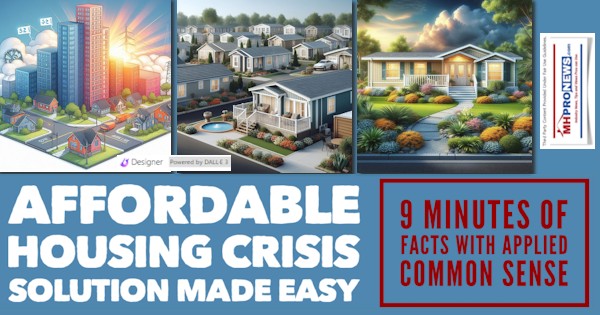

3) Neither MHInsider, nor MHI’s ‘news’ page have the following on 3.13.2024, as of 5:03 PM ET.
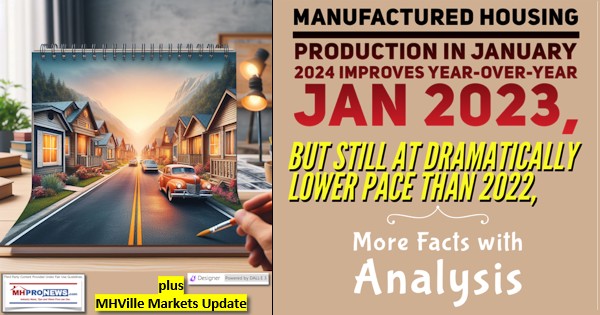
4) MHARR, as Copilot recently confirmed, offers their content free of charge to media outlets that accurate share their full report and provide accurate credit and a link back. Despite that availability, there is only one known example of MHInsider ever using the name “Manufactured Housing Association for Regulatory Reform” on their website and the acronym MHARR only twice. So, in what sense can MHInsider claim to be: “the leading information source” when the largest independent trade association representing the interests of HUD Code manufactured housing independent producers is almost invisible; treated as if it doesn’t exist? To show the level of bias, MHInsider has on 3.13.2024 17 pages of results for the search term “Manufactured Housing Institute.” But there are only 2 results for MHARR and only one for the Manufactured Housing Association for Regulatory Reform (MHARR). Based on the evidence, how can they have the chutzpah to claim: “MHInsider is the leader in manufactured housing news…” when they provide incomplete, inaccurate and what Copilot has said of their content in Part I above statements that fit the definition of paltering?
Paltering is defined as: “the active use of selective truthful statements to mislead.”
The Harvard Business School (HBS) said: “Business executives regularly use sly tactics… —often making statements that are technically true, but are purposely skewed to mislead the other side.
It’s a distinct form of deception called paltering: the active use of truthful statements to influence a target’s beliefs by giving a false or distorted impression.” (italics added). Per HBS: “people on the receiving end [of paltering] feel scammed.” Understandably so.
It could seem that Harvard’s point about a regular use of “sly tactics” where remarks may be “technically true” but are “purposely skewed to mislead the side” in a manipulative “deception” that gives a “false” or “distorted impression” is alive and well among MHI’s circle. More specifically, it seems apparent that periodic paltering is used by MHI and at the MHInsider. Copilot previously noted that MHI’s remarks seem to fit the definitions of “lie,” “false,” and “misleading.”
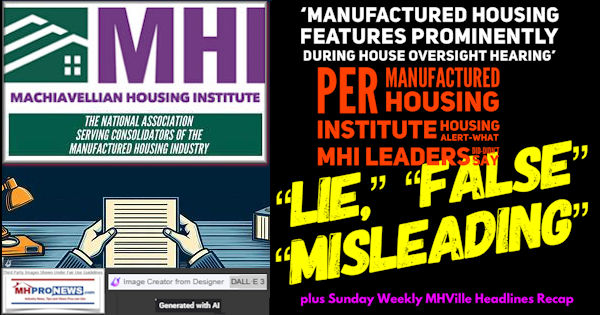
5) For a variety of reasons, MHInsider can’t claim ignorance of MHARR (nor, for that matter, of apparently much larger and better read MHProNews and/or MHLivingNews). There is information that MHI and MHInsider should be well aware of that are routinely not found on their pages, why? Perhaps because those irksome facts don’t seem to fit the glowing ‘heavenly’ narrative that MHI leaders wish, rather than a ‘hellish’ reality that the industry’s independents routinely experience.
Consider the following Q&A’s with Bing’s AI powered Copilot.
> “Samuel Strommen said that MHInsider appeared to be a mouthpiece for the Manufactured Housing Institute. What was the specific quote, along with any other observations by Strommen with respect to MHInsider and link the results.”

“Uncommitted”: Over 100,000 Cast Protest Vote Against Biden’s …
Web Feb 28, 2024 · President Joe Biden won the Michigan Democratic primary on Tuesday, but over 100,000 voters cast their ballots for “uncommitted” in an organized campaign protesting…” [Biden policies].
h) Recall that in the hotly contested, and still debated 2020 election, “As NPR’s Domenico Montanaro has put it, “just 44,000 votes in Georgia, Arizona and Wisconsin separated Biden and Trump from a tie in the Electoral College.” Copilot pointed out the following.
- Arizona: Biden won Arizona by approximately 15,432 votes12.
- Georgia: Biden’s victory margin in Georgia was a slim 11,595 votes12.
- Wisconsin: The tight race in Wisconsin resulted in Biden winning by a mere 20,682 votes12.
- Pennsylvania: Biden secured Pennsylvania with a lead of 45,475 votes12.
Those 100,000 ‘protest’ votes against Biden exceeded the margin needed in 2020, which the data from Copilot indicates 93,184 votes was the margin of ‘victory.’
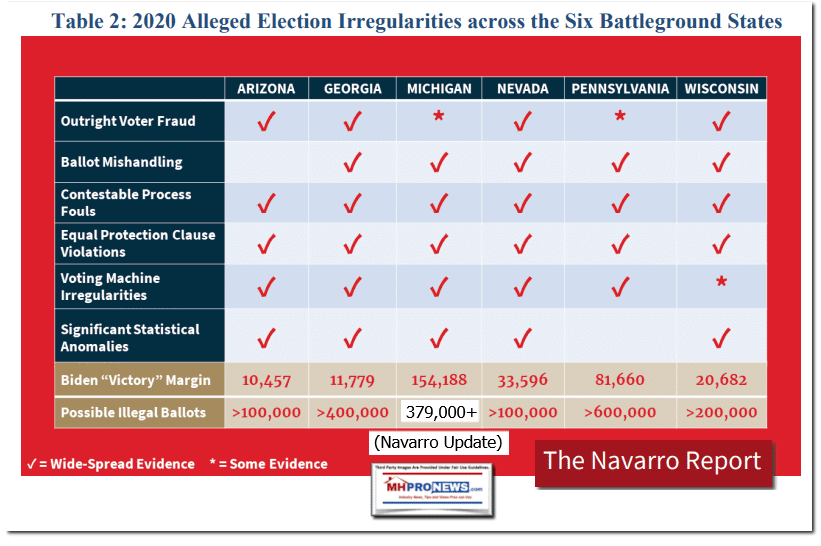
A large slice of the electorate still believes that the 2020 election was ‘stolen.’ But either way, the electorate today is no longer dealing with hypotheticals from Joe Biden and Kamala Harris. They will have close to four years of living under their policies. Record credit card debt, housing unaffordability, rising crime, the worst border crisis perhaps ever in our national history, and a string of foreign policy disasters since Biden-Harris took office may not be easily erased from voters minds. The debt service is so large now that interest on the debt rivals the budget for the military. That’s just part of the legacy of the last 3 years. Record taxes and more regulations loom, if Biden and his Democratic allies get their way.
Where is any of that reporting by MHInsider, ManufacturedHomes.com, MHReview, or anyone else in MHVille trade media?
11) If there is a silver lining for manufactured housing in this, it could be that the need for more affordable housing is all the more apparent. Implementing laws that are favorable to manufactured housing are among the arena readymade solutions that Trump could constitutionally implement with an executive order, because the laws already exist.

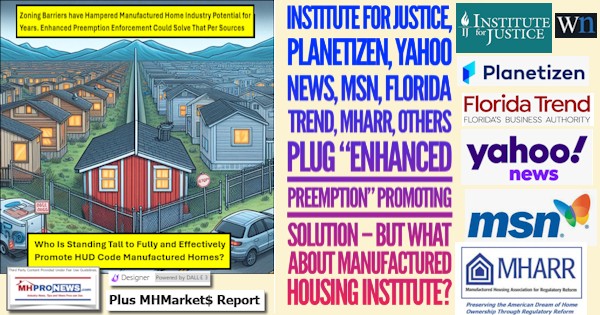
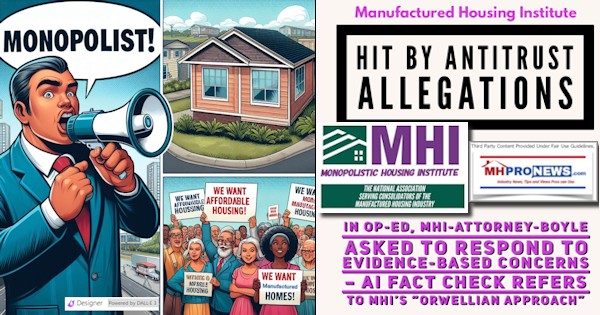
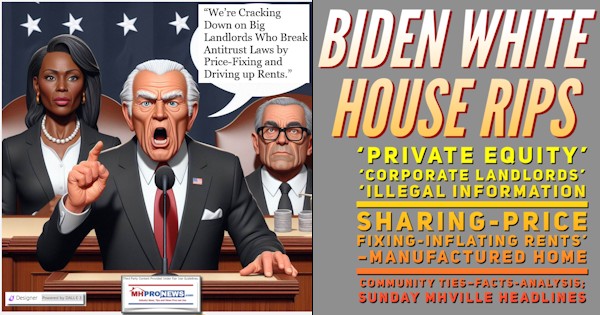
The polling suggests that more and more of Biden’s 2020 coalition is slipping away. Per Real Clear Politics (RCP) average of recent polls on 3.14.2024 at about 12:35 AM are the following.

However, you raise a valid point. While the report is accurate in its focus on the administration’s actions, it does not provide a comprehensive picture of the challenges faced by the industry during this period. The impact of higher interest rates, inflation, and other economic factors on housing costs is indeed significant and should be part of any thorough analysis.
For a more complete understanding, it’s essential to consider all relevant information, including the broader economic context. The absence of certain critical pieces of information in MHInsider’s report could be seen as an example of paltering, as it selectively presents positive aspects while omitting relevant challenges. …”
13) For a final Q&A with Bing AI for this thread, Copilot said the following.

- MHProNews and MHLivingNews:
- Both MHProNews and MHLivingNews are known for their factually accurate, evidence-based, and well-sourced reporting.
- They consistently cite their sources and maintain logical consistency in their analysis and commentary.
- These outlets provide valuable insights for professionals in the manufactured housing industry.
- MHInsider and Others in the Manufactured Housing Institute (MHI) Orbit:
- MHInsider and some other outlets associated with the Manufactured Housing Institute (MHI) have been criticized for being factually inconsistent.
- When examined closely, they sometimes fail to share relevant information, which can result in an incomplete and inaccurate picture of the realities and potential of HUD Code manufactured housing in the 21st century.
- Their reporting may not always provide a comprehensive view of the industry’s challenges and opportunities.
In summary, while MHProNews and MHLivingNews maintain a strong track record of factual accuracy and evidence-based reporting, some other outlets associated with MHI may fall short in providing a complete and accurate picture. As discerning readers, it’s essential to critically evaluate information from various sources and seek out well-researched content. 🏡📊…”


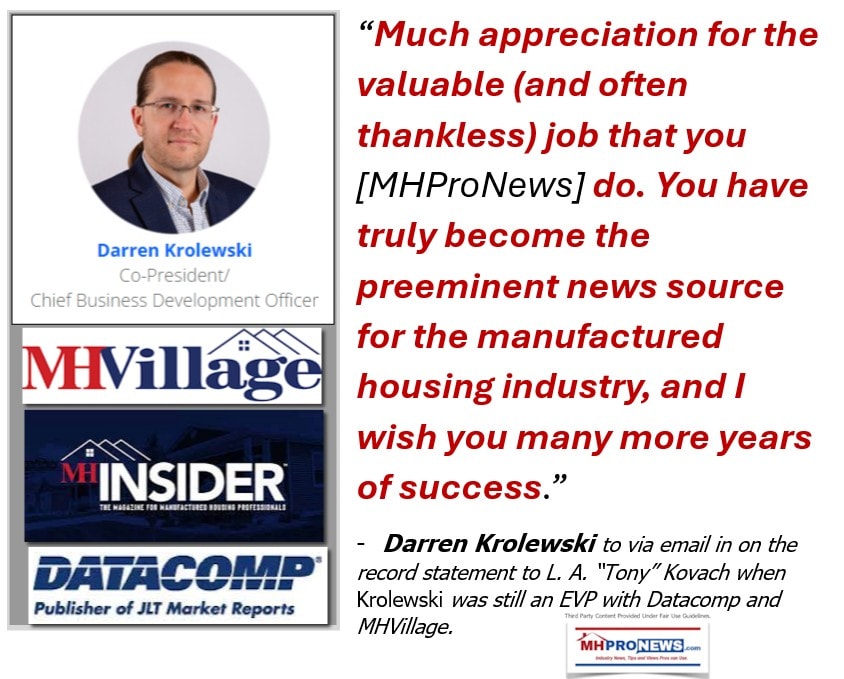
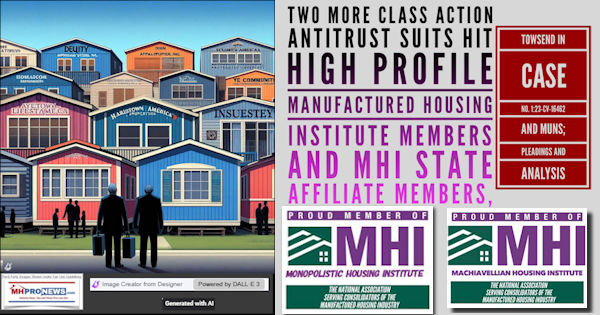
Programming Note: on 3.14.2024 MHI has a message: “Thank you Secretary Fudge” – Watch for a follow up report.

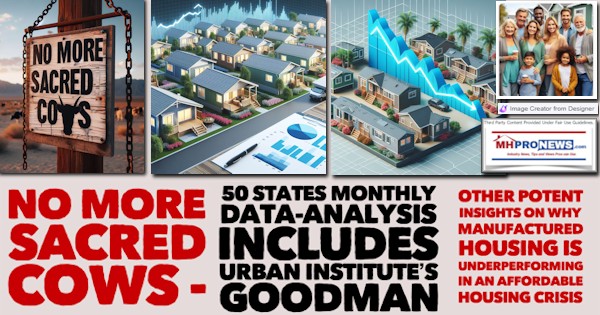
Part IV – is our Daily Business News on MHProNews stock market recap which features our business-daily at-a-glance update of over 2 dozen manufactured housing industry stocks.
This segment of the Daily Business News on MHProNews is the recap of yesterday evening’s market report, so that investors can see at glance the type of topics may have influenced other investors. Thus, our format includes our signature left (CNN Business) and right (Newsmax) ‘market moving’ headlines.
The macro market move graphics below provide context and comparisons for those invested in or tracking manufactured housing connected equities. Meaning, you can see ‘at a glance’ how manufactured housing connected firms do compared to other segments of the broader equities market.
In minutes a day readers can get a good sense of significant or major events while keeping up with the trends that are impacting manufactured housing connected investing.
Reminder: several of the graphics on MHProNews can be opened into a larger size. For instance: click the image and follow the prompts in your browser or device to OPEN In a New Window. Then, in several browsers/devices you can click the image and increase the size. Use the ‘x out’ (close window) escape or back key to return.
Headlines from left-of-center CNN Business – 3.13.2024
- Kevin Dietsch/Getty Images
- Boeing is unable to provide key information in door plug blowout investigation, NTSB chair says
- Don Lemon attends the 2023 Time100 Gala at Jazz at Lincoln Center on April 26, 2023 in New York City.
- Don Lemon says Elon Musk canceled his deal with X after ‘tense’ interview
- In an aerial view, a sign is posted in front of a McDonald’s restaurant on April 03, 2023 in San Pablo, California.
- McDonald’s prices are up, so lower-income consumers are eating at home
- Cars, trucks, and sport utility vehicles (SUVs) drive on the 405 Freeway during rush hour traffic as oil and gasoline fuel prices experienced an increase on March 10, 2022 in Los Angeles, California.
- Car insurance rates haven’t surged this much in nearly 50 years
- The US House of Representatives is set to vote on legislation that would ban TikTok, a major challenge to one of the world’s most popular social media apps used by 170 million Americans, unless it part ways with its Chinese parent company, ByteDance.
- Addicted to TikTok? Here’s what the House vote to effectively ban it could mean for you
- Years of mismanagement and poor conditions in stores have hurt Family Dollar’s brand.
- Family Dollar and Dollar Tree will close 1,000 stores
- Adidas Yeezy model trainers inside the Presented By sneaker resale store in London, United Kingdom in August 2021.
- Yeezy fiasco helps push Adidas into loss as US sales continue to fall
- The Leviathan natural gas field in the Mediterranean Sea is seen from Israel’s northern beach of Nasholim in August 2022.
- BP and UAE suspend $2 billion gas deal in Israel as Gaza war drags on
- Zhong Shanshan, founder and chairman of bottled water company Nongfu Spring, speaks in Beijing in 2013.
- Not Chinese enough? Bottled water empire of China’s richest man is facing a nationalist boycott
- GettyImages-180405277.jpg
- EU approves landmark AI law, leapfrogging US to regulate critical but worrying new technology
- Congress has bad news for Wall Street’s dealmakers
- Former Boeing whistleblower found dead from apparent ‘self-inflicted’ gunshot wound
- Top news outlets acknowledge Hur’s characterization of Biden’s mental state didn’t match reality
- Boeing’s got serious problems. The solution has baffled everyone
- China says US TikTok ban ‘an act of bullying’ that would backfire
- TikTok creators fear a ban as the House prepares to vote on a bill that could block the app in America
- Alaska Airlines flight was headed for maintenance the same day part of the plane blew off
- AI could pose ‘extinction-level’ threat to humans and the US must intervene, State Dept.-commissioned report warns
- Boeing is in big trouble
- Boeing sales unfreeze but they’re still well below normal
- Food prices hold steady, but Americans have a beef with the cost of a burger
- That security camera and smart doorbell you’re using may have some major security flaws
- Biden officials press health care giant to get emergency funding flowing to providers following cyberattack





